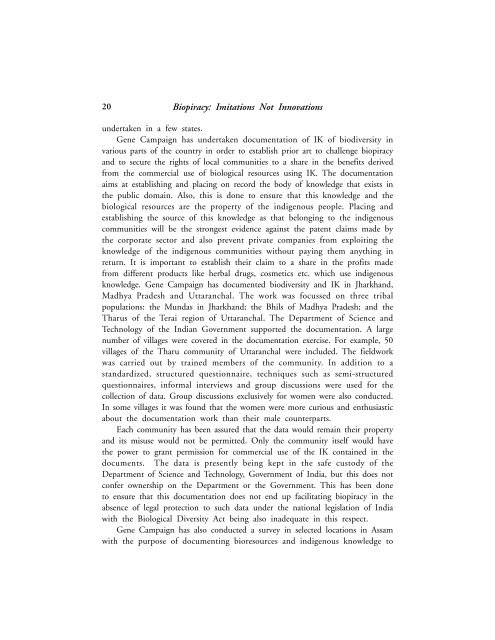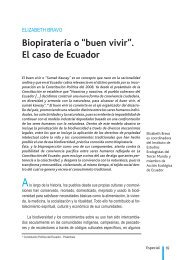BIOPIRACY Imitations Not Innovations - Biopirateria
BIOPIRACY Imitations Not Innovations - Biopirateria
BIOPIRACY Imitations Not Innovations - Biopirateria
Create successful ePaper yourself
Turn your PDF publications into a flip-book with our unique Google optimized e-Paper software.
20 Biopiracy: <strong>Imitations</strong> <strong>Not</strong> <strong>Innovations</strong><br />
undertaken in a few states.<br />
Gene Campaign has undertaken documentation of IK of biodiversity in<br />
various parts of the country in order to establish prior art to challenge biopiracy<br />
and to secure the rights of local communities to a share in the benefits derived<br />
from the commercial use of biological resources using IK. The documentation<br />
aims at establishing and placing on record the body of knowledge that exists in<br />
the public domain. Also, this is done to ensure that this knowledge and the<br />
biological resources are the property of the indigenous people. Placing and<br />
establishing the source of this knowledge as that belonging to the indigenous<br />
communities will be the strongest evidence against the patent claims made by<br />
the corporate sector and also prevent private companies from exploiting the<br />
knowledge of the indigenous communities without paying them anything in<br />
return. It is important to establish their claim to a share in the profits made<br />
from different products like herbal drugs, cosmetics etc. which use indigenous<br />
knowledge. Gene Campaign has documented biodiversity and IK in Jharkhand,<br />
Madhya Pradesh and Uttaranchal. The work was focussed on three tribal<br />
populations: the Mundas in Jharkhand; the Bhils of Madhya Pradesh; and the<br />
Tharus of the Terai region of Uttaranchal. The Department of Science and<br />
Technology of the Indian Government supported the documentation. A large<br />
number of villages were covered in the documentation exercise. For example, 50<br />
villages of the Tharu community of Uttaranchal were included. The fieldwork<br />
was carried out by trained members of the community. In addition to a<br />
standardized, structured questionnaire, techniques such as semi-structured<br />
questionnaires, informal interviews and group discussions were used for the<br />
collection of data. Group discussions exclusively for women were also conducted.<br />
In some villages it was found that the women were more curious and enthusiastic<br />
about the documentation work than their male counterparts.<br />
Each community has been assured that the data would remain their property<br />
and its misuse would not be permitted. Only the community itself would have<br />
the power to grant permission for commercial use of the IK contained in the<br />
documents. The data is presently being kept in the safe custody of the<br />
Department of Science and Technology, Government of India, but this does not<br />
confer ownership on the Department or the Government. This has been done<br />
to ensure that this documentation does not end up facilitating biopiracy in the<br />
absence of legal protection to such data under the national legislation of India<br />
with the Biological Diversity Act being also inadequate in this respect.<br />
Gene Campaign has also conducted a survey in selected locations in Assam<br />
with the purpose of documenting bioresources and indigenous knowledge to



